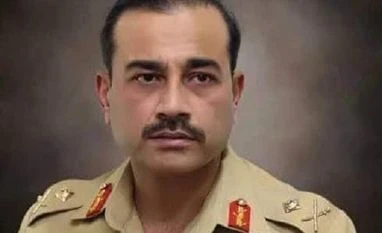Lt General Asim Munir has been appointed Pakistan's new chief of army staff (COAS) by Pakistan PM, Shehbaz Sharif. Pakistan information minister Marriyum Aurangzeb announced the decision on Twitter. Munir is the former director-general of Pakistan's Inter-Services Intelligence (ISI).
"The Prime Minister of Pakistan Muhammad Shehbaz Sharif has decided to appoint Lt Gen Sahir Shamshad Mirza as the Chairman of the Joint Chiefs of Staff and Lt Gen Syed Asim Munir as the Chief of the Army Staff using the constitutional authority. A summary of this has been sent to the President of Pakistan," Aurangzeb wrote in a tweet in Urdu.
Lt Gen Asim Munir was set to retire on November 27. With this appointment, the retirement has been postponed, and he gets a three-year tenure as COAS.
During PM Imran Khan's tenure, Munir was removed from the post of the DG ISI within eight months of his appointment and replaced with Lt Gen Faiz Hameed in 2019.
Minutes before the announcement was made, defence minister Khawaja Asif told the media that everything had been settled according to the law and the Constitution and must not be seen through a "political lens".
He further said that he hoped president Arif Alvi would not make the appointments "controversial", according to Dawn.
"This is also a test for President Alvi, whether he will follow political advice or the constitutional and legal advice," Asif said in another tweet.
Current COAS Qamar Javed Bajwa was supposed to retire in 2019. His tenure was, however, extended by then-prime minister Imran Khan in August 2019. However, Bajwa has repeatedly stated his wish to retire this year.
In the last few months, Bajwa has said this at least twice. Once during his visit to the USA and another while speaking at the National Defence University. Pakistani media often reported that the army chief's appointment was a major subplot in the country's politics.
Earlier in 2022, when a no-confidence motion was tabled against Khan, he offered an indefinite extension to Bajwa.
On November 1, however, Bajwa started his farewell visits to formations. He is set to retire on November 29.
Lt Gen Sahir Shamshad Mirza has been elevated to Chief of the Joint Chiefs of Staff Committee.
The CJCS is the highest authority in the hierarchy of the armed forces, but the key powers, including mobilisation of troops, appointments and transfers, lie with the Chief of Army Staff, which makes the person holding the post the most powerful in the military.
The Pakistan Army, which has ruled the country for over half of its 75-plus years of existence, has hitherto wielded considerable power in security and foreign policy matters.
Moving up the ranks
- Chief of Pakistan's two most influential intelligence agencies, the Inter-Services Intelligence (ISI) and the Military Intelligence
- Prematurely removed as chief of the ISI on the request of then prime minister Imran Khan
- Currently serving as the army’s quartermaster general
- Senior-most general after outgoing army chief General Qamar Javed Bajwa
- He will be Pakistan's 17th army chief since its independence in 1947. That compares with about 30 prime ministers during the same period
The recommendation of the Prime Minister is binding on the President, but the latter can delay the appointment for some time. Some media reports showed that the President can hold the summary for the appointment for 25 days. However, the government official rejected the reports that the President could delay the appointment.
There has been extraordinary interest in the appointment of Bajwa's successor as many believe ousted prime minister Imran Khan's long march is linked to the change of command in the Army.
He has asked his supporters to gather in Rawalpindi on November 26, two days before Gen Bajwa hands over the baton to the new Army chief.
The debate over the appointment of the new chief has intensified since the Inter-Services Public Relations (ISPR), the media wing of the military, confirmed last week that General Bajwa would doff off his uniform on November 29.
The debate is also linked to the current political stalemate stemming from Khan's long march demanding early elections.
Political observers are of the view that one of the objectives of Khan's long march is to influence the Army chief's appointment, even though Khan has denied such claims.
Prime Minister Shehbaz Sharif recently paid a private visit to London, where he consulted his brother and former prime minister Nawaz Sharif on the issue. After his return, he took all coalition partners on board.
The role of President Alvi has come to the limelight in the appointment process, as some media reports claimed that he could hold the notification for 25 days.
Foreign Minister Bilawal Bhutto-Zardari on Saturday advised President Alvi against creating any sort of disorder in the Army chief's appointment.
(With inputs from PTI)
Khan’s failing gambit? A history of bad blood
Former Pakistan PM Imran Khan played all his cards to thwart Sharif appointing the successor to Gen Bajwa as his political fortune hinges on the same. Khan has been pressing for snap elections since his outser in April and his plans to put-off the next army chief selection until fresh elections went down the drain. Khan cut short Munir’s stint as DG-ISI in 2019 in a mere of 8 months after his appointment. Khan was said to be furious with Munir after he reportedly brought to the PM’s notice that the family of Khan’s wife, Bushra Bibi, was involved in corrupt practices. (Agencies)
Unlock 30+ premium stories daily hand-picked by our editors, across devices on browser and app.
Pick your 5 favourite companies, get a daily email with all news updates on them.
Full access to our intuitive epaper - clip, save, share articles from any device; newspaper archives from 2006.
Preferential invites to Business Standard events.
Curated newsletters on markets, personal finance, policy & politics, start-ups, technology, and more.
)